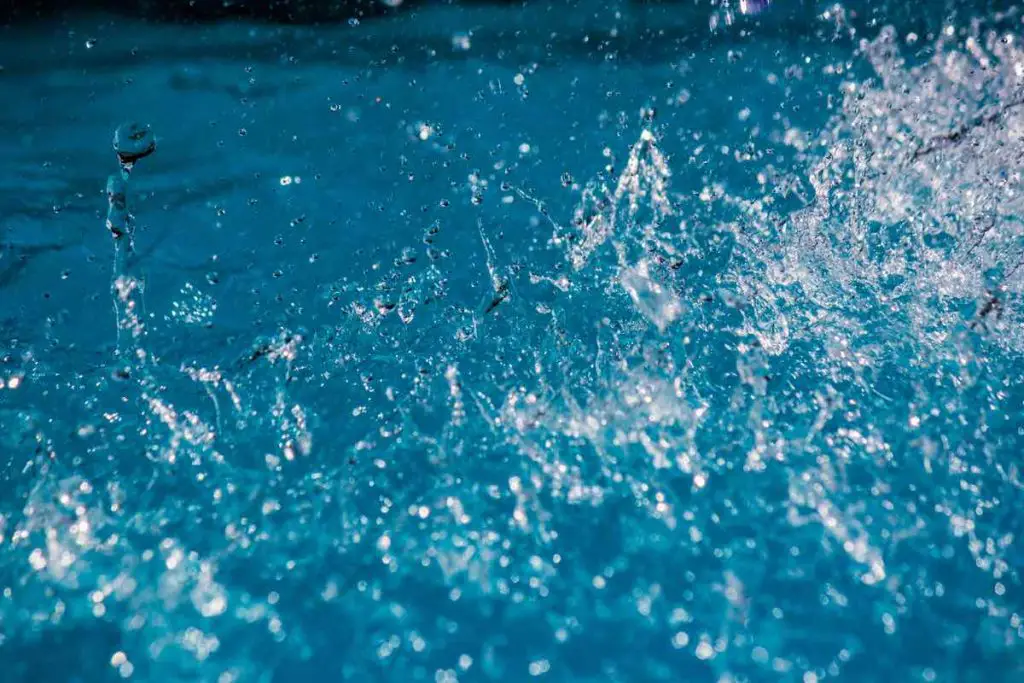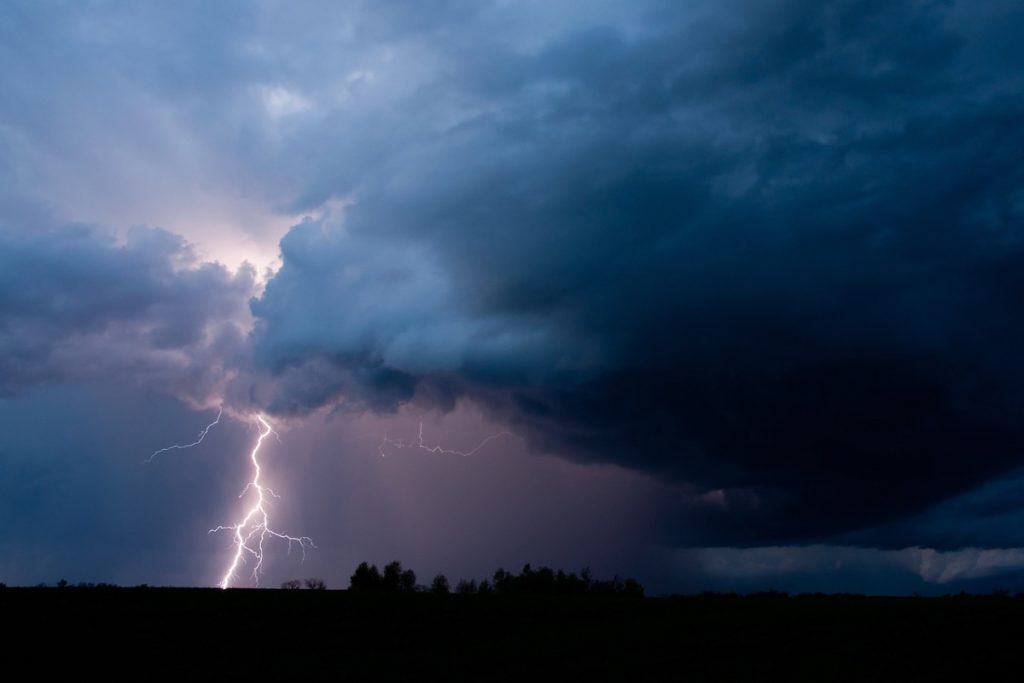Figuring out what safety steps to take during a lightning storm can be more challenging than most people realize. Most people know not to stand under trees during a lightning storm, but not everyone knows the rules on pools. Is your pool safe to use – and does it attract lightning, increasing the risk to your property?
A swimming pool does not attract lightning. However, this doesn’t mean swimming in a residential pool during a lightning storm is safe. Water is excellent at conducting electricity. Therefore, if your pool is struck by lightning, you are at risk of being electrocuted in an outdoor pool.
In this article, I’ll answer all the questions you may have about swimming during a lightning storm. I’ll explain why swimming in an outdoor pool isn’t safe and whether it is okay to use an indoor pool.

Why Swimming Outside During a Thunderstorm Is Dangerous
Many people think it is safe to swim outside during a storm, as they believe lightning only strikes tall objects. It’s easy to understand why you may think that swimming in an in-ground pool is safe.
However, the idea that lightning only strikes the tallest structure in an area is a myth. There is a higher likelihood that lightning will hit taller structures due to the shorter distance lightning needs to travel. However, this doesn’t mean the chance of lightning hitting objects that are low and close to the ground is nonexistent.
As mentioned above, water conducts electricity. However, when lightning strikes water, it doesn’t go deep into the water and rarely hits the bottom of the pool. This is another reason people believe that swimming outside is okay.
However, this property of lightning in water actually makes things worse rather than better. Instead of going straight down, lightning travels horizontally over the water. This means that, instead of only affecting a small portion of the pool, it travels through the water, electrifying it.
This doesn’t mean that the lightning will electrify your entire pool. How much of the water in the pool is affected by lightning depends on several factors. For example, the power of the lightning bolt and your pool’s size. However, there’s no way to tell how strong a lightning bolt will be without specialized equipment. Therefore, you’re always taking a risk when swimming outside during lightning.
When the lightning does electrify the water, it makes it extremely dangerous to be in the pool. Not only is the water itself a risk, other elements of a pool, can conduct electricity very well.
Additionally, there’s also a concern regarding salt in pools. Even with a saltwater pool, the salt levels in your pool are nowhere near what you’d find in the sea. However, any additional salt is a risk since saltwater conducts electricity better than fresh water. So, if you have a saltwater pool, swimming in it when there is lightning is an additional risk.
Dying or being injured due to electrocution is not the only concern when swimming during a lightning storm. In one incident, two boys swimming in an outdoor community pool were stunned unconscious when lightning hit the water. As a result, despite being good swimmers, they drowned, even though the pool did not attract lightning.
So, there are other risks that make entering a pool during a lightning storm dangerous.
Additionally, swimming in a pool during a lightning storm increases the risk that you will be struck by lightning. While water is a great conductor of electricity, the human body is a much better conduit. Since lightning is more likely to hit taller objects, if you are the tallest thing in the water, you are more likely to be struck. Additionally, it is more likely to strike things that are better at conducting electricity.
In a pool, that means you.
If lightning strikes you, there is a significant risk of cardiac arrest. Other dangers include:
- Brain hemorrhage
- Strokes
- Brain damage
- Long-term neurological and muscle damage
Even if you survive the strike, you will experience deep thermal burns. The worst damage will be to the tissue around your bones. Furthermore, a lightning strike can cause ruptured eardrums due to the sound of the strike.
No matter how you look at it, being in an outdoor pool during a lightning storm is extremely dangerous. But what about an indoor pool?
Swimming Inside During a Thunderstorm
If you have a membership to an indoor pool, you’ve likely had your pool close due to weather. However, given that the pool is inside, with no way to attract lightning, shouldn’t it be safe to swim in?
The answer is: almost certainly.
There are no proven fatalities due to lightning striking an indoor pool. In fact, some people argue that clearing indoor pools during lightning storms is actually unsafe. Closing pools cause many people to leave the indoor facility and enter their cars, putting them at risk. Even if they stay inside, they pick up electronic devices like phones, which is another risky action.
However, while there is no proven incident of a fatality as a result of lightning hitting an indoor pool, there is still a risk that lightning strikes can happen.
The National Lightning Safety Institute notes that there is a risk that lightning could hit a conductor outside the pool and travel into the pool . If lightning strikes a metal water line near the facility that houses the pool, it could travel into the pool via the ground.
There’s a worry that if lightning hits outdoor elements of pool’s electrical components, it could travel into the pool itself. This risk is minimal due to the guidelines in the National Electrical Code, but it exists.
Essentially, the reason why facilities that house indoor pools close during lightning is to reduce the risk of an unfortunate incident, even though such a risk is minor. If you have an indoor pool at your house, it is up to you to decide whether the risk is one you’re okay with.
However, an understanding of the extremely low risk involved for indoor pools has resulted in a change in policy in some places. The indoor pools at Queens University of Charlotte and Huntersville Family Fitness and Aquatics remain open during a lightning storm unless there is a power outage.

Final Thoughts
Swimming pools do not attract lightning. However, water conducts electricity very well, and swimming in an outdoor pool during a lightning storm is extremely risky. Despite the low risk of swimming indoors during a lightning storm, many facilities choose to close their pools.
Sources
- Aquatics International: When Lightning Strikes
- National Recreation and Park Association: Lightning Safety and Indoor Pools: To Clear or Not to Clear
- WBTV: Can you really get struck by lightning while swimming in an indoor pool?
- Atrium Health: What Happens To the Human Body When it’s Struck by Lightning?
- CircuPool: What Are Salt Pools Like (Are They Salty?)
- Tampa Bay Times: Lightning hits pool causing boys to drown
- Hong Kong Observatory: Does lightning always strike the tallest object?
- Swim Jim: Why It’s a Bad Idea to Go Swimming During a Thunderstorm
- Green Sphere Demolition Inc: What Happens if Lightning Strikes a Swimming Pool?
- Sunsational Swim School: Storms & Water Safety – How to Stay Pool Safe
